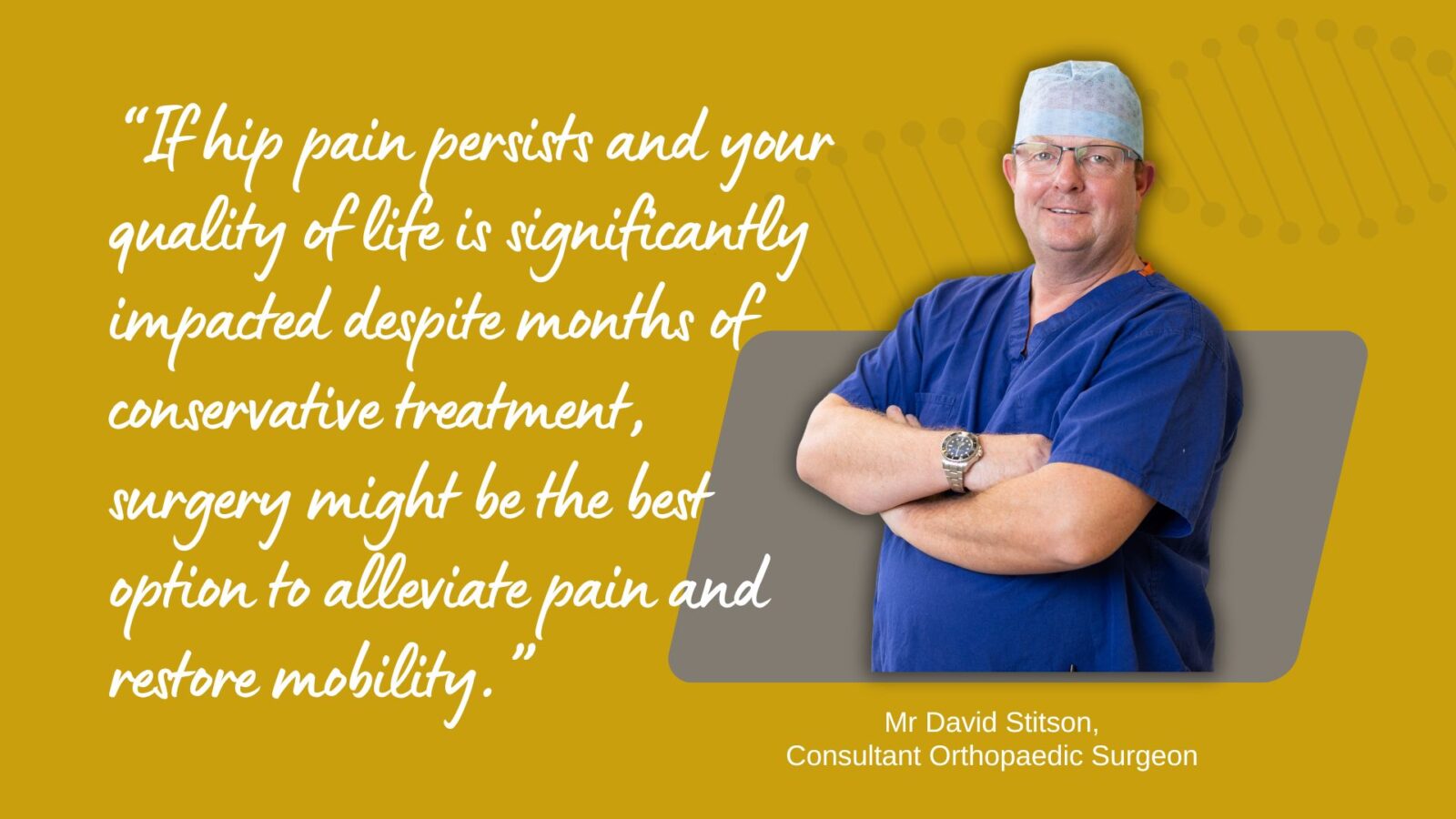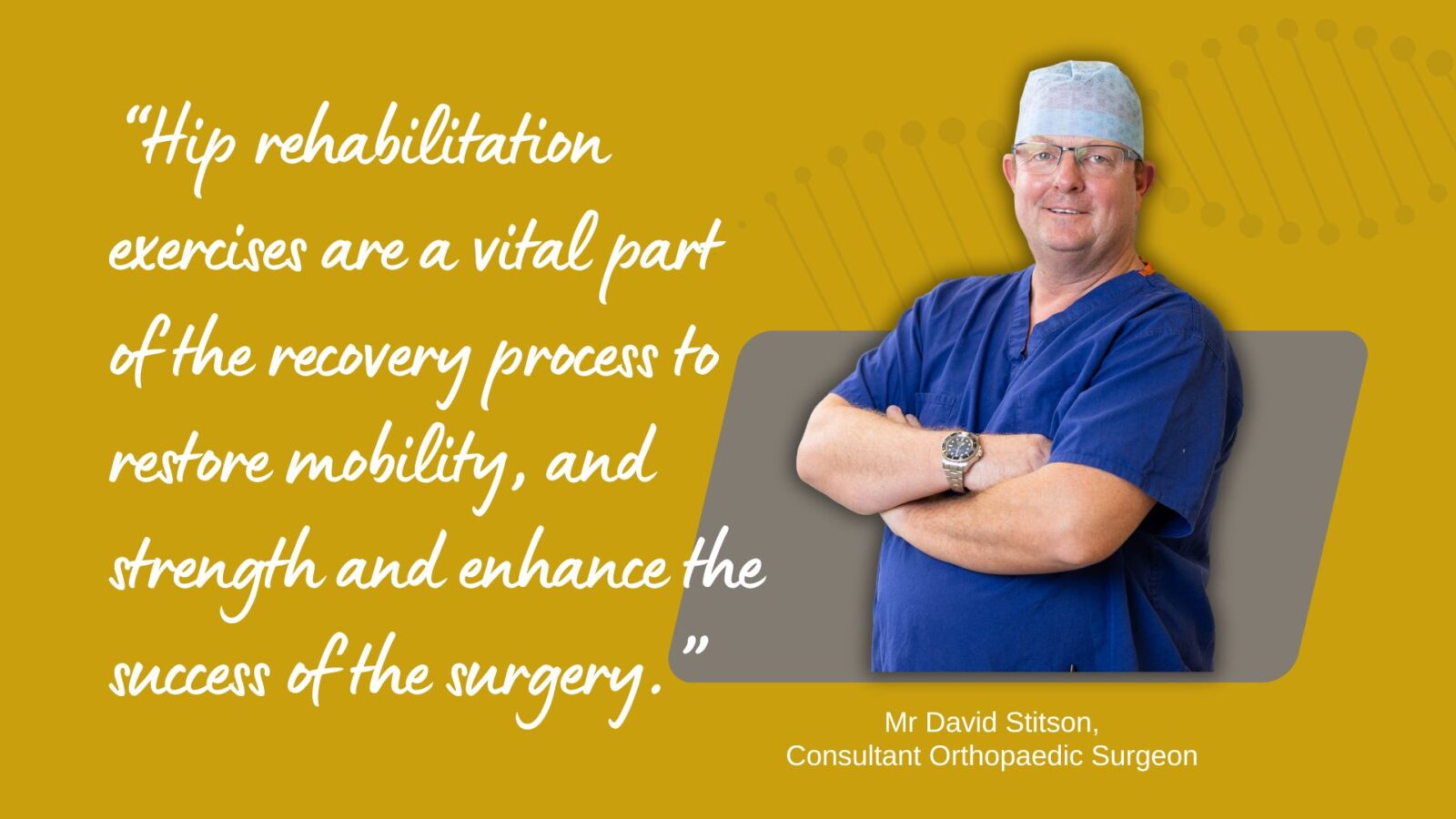Question: What is Total Hip Replacement?
Answer: Total Hip Replacement is a procedure in which a damaged hip joint is replaced with a prosthetic implant. This surgery is typically recommended for patients who suffer from severe hip pain and reduced mobility due to conditions such as osteoarthritis, rheumatoid arthritis or hip fractures.
Contents
ToggleQuestion: Who is a candidate for a total hip replacement?
Answer: Candidates for a total hip replacement are usually individuals who have significant hip pain that interferes with daily activities, have not found relief from other treatments like medications or physiotherapy and have damage to the hip joint detectable on X-rays or scans.
Question: How long does total hip replacement surgery take?
Answer: The duration of total hip replacement surgery varies, but it generally takes around an hour for Mr Stitson to complete. Additional time will be required for anaesthesia and initial post-operative recovery in the recovery room.
Question: What type of anaesthesia is used during total hip replacement surgery?
Answer: Total hip replacement surgery is typically performed under spinal anaesthesia, often with sedation. Sometimes a general anaesthetic with nerve blocks may be used instead. Mr Stitson will discuss the options with you based on your health and preferences. The final decision on the most appropriate form of anaesthetic will be made with a consultant anaesthetist.
Question: What are the risks associated with total hip replacement surgery?
Answer: Risks of total hip replacement surgery include infection, blood clots (Deep Vein Thrombosis or Pulmonary Embolus), dislocation, nerve injury, fractures, difference in leg length, fracture, bleeding, death (risk varies with age and associated health conditions), loosening or failure of components leading to need for revision surgery. Fortunately, these complications are relatively rare, and your surgical team take steps to minimise them.
Question: How long is the recovery period after total hip replacement surgery?
Answer: Recovery time varies by patient but most people can return to light activities within 6 to 12 weeks. Full recovery and the return to more strenuous activities can take 3 to 6 months. Physiotherapy and adherence to post-operative instructions are crucial for a successful recovery.
Question: Will I have to stay in the hospital after total hip replacement surgery?
Answer: Yes, you will typically need to stay in the hospital for a night or two after your total hip replacement. This allows your medical team to monitor your initial recovery and ensure you are stable before going home. Day-case total hip replacement may be appropriate in certain cases.
Question: What kind of rehabilitation is needed after total hip replacement surgery?
Answer: Rehabilitation involves physiotherapy to help restore strength and mobility. Your physiotherapist will guide you through exercises that promote healing, improve range of motion and strengthen the muscles around the new hip joint.
You can find a guide to the best exercises for a hip replacement here »
Question: How long will my new hip joint last after total hip replacement surgery?
Answer: Modern hip implants are designed to be durable and can last 20 years or longer, depending on factors including your age, activity level, weight and overall health. Advances in materials and techniques have improved long-term outcomes for hip replacement patients.
Question: Can I return to normal activities after total hip replacement surgery?
Answer: Yes, most patients can return to many of their normal activities after recovery, including walking, swimming and low-impact sports. However, high-impact activities like running or heavy lifting may need to be limited to preserve the lifespan of the new hip joint. Always consult Mr Stitson before resuming any strenuous activities.
It is essential to discuss all your options with Mr Stitson, who can guide you through the treatment process and advise on how you can achieve the best possible outcome.
About Hip Surgery
Hip replacement surgery replaces the worn-out, painful and stiff hip joint with a new prosthetic joint. This procedure is normally performed under spinal anaesthesia and is commonly followed by a night or two in the hospital. Day-case hip replacement surgery may be an appropriate option for you.

About Mr Stitson
David Stitson is a Plymouth-based Consultant Trauma and Orthopaedic Surgeon. Trained both in the UK and internationally, he has worked in medicine for more than 20 years for the NHS, for the Royal Air Force and in private practice. Mr Stitson operates privately at the Nuffield Health Hospital, Plymouth.

The Nuffield Plymouth CQC Rating
The Nuffield Hospital has a history that spans over half a century and has built a reputation for high standards of care, professionalism and expertise in delivering health services. They aim for continuous quality improvement in everything they do.
Active Quality and Governance programmes are in place at the Nuffield Hospital Plymouth. As part of this, the hospital is inspected by independent healthcare regulators to ensure it meets the fundamental standards of quality and safety as determined by the regulating body (CQC).
In the most recent inspection, Plymouth Nuffield Hospital was rated as ‘Good’ overall, however, the surgical element of the inspection was rated as ‘Outstanding’. The hospital was referred to as:
“Outstanding in effective and caring, and
Good in safe, responsive and well-led.”






